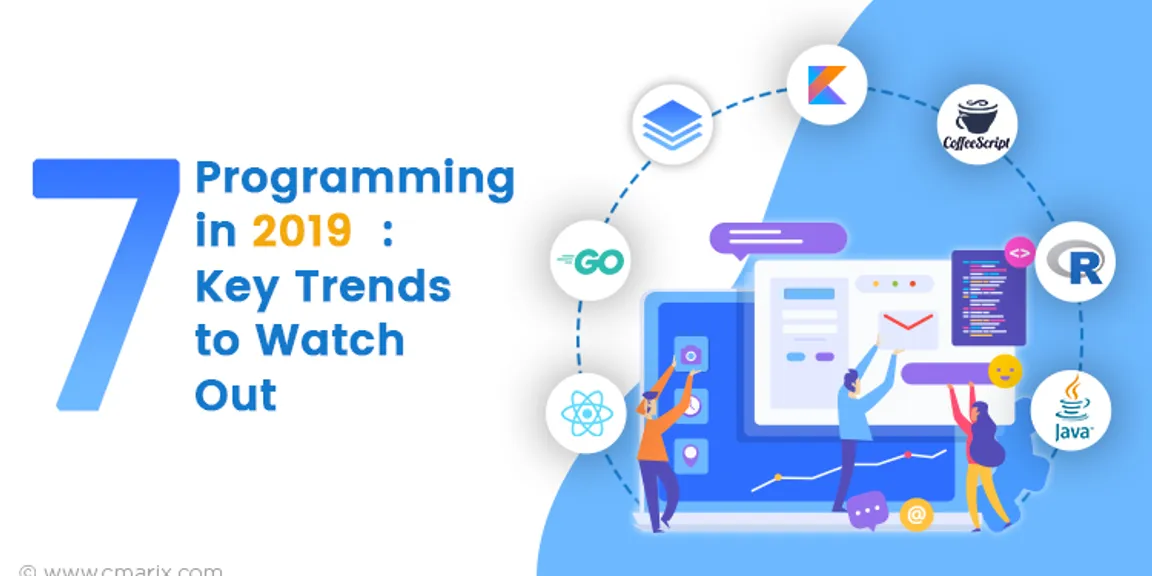

7 Trends That Will Dominate Mobile App Development in 2019 and Beyond
The New Year is around the corner and reasonably developers are on the lookout for new trends. Obviously, many of these trends are a continuation of the trends that are getting prominent and louder over a couple of years. Alongside this, there is obviously the big promise of new technologies penetrating the mobile app development scene.
Considering all, here we picked up some of the most likely development trends in 2019 any mobile app development company needs to watch out.
1. Artificial Intelligence (AI) And Machine Learning (ML)
Artificial intelligence (AI) is no longer a breathtaking new technology in the mobile app development landscape. It has already penetrated the app development of smarter applications offering stealthy and most useful interactions. On the other hand, Machine Learning (ML) simultaneously made big progress by allowing developers to utilise user data to build more personalised applications.
It is very likely that throughout the coming years we will see more mobile apps across the platforms to use AI and ML for effective user interactions. According to industry veterans and experts, AI will ease out the customer service process remarkably and reduce the need for manpower input to a great extent.
Many statistical figures confirm the likely domination of AI and ML throughout 2018 and beyond. As per the IDC, by the time we reach 2018, bigger three fourth of employees who at present are using ERP solutions will go for AI-powered solutions with the objective of boosting efficiency and productivity. On the other hand, AI-powered chatbots will play a bigger role than ever before for customer service operation across business niches. According to premier technology think tank Gardner, more than 80% of communications across customer service departments will use ChatBots or mobile apps equipped with Chatbots by the year 2020.
2. Integrated Chatbots
As we have already discussed in relation to the dominance of AI, Chatbots in the coming years are going to play a massive role in the customer service, online retail and ecommerce, customer journey and onboarding management. As Chatbots are getting more intelligent and personalised with the feeding of machine-engineered insights, they will be used more extensively mobile apps in the time to come.
Chatbots are already seen as a technology with long-ranging implications including tremendous cost saving by reducing the manpower, continuous user engagement and effortless user experience for mobile apps. Juniper Research recently predicted that by the time we reach 2022, Chatbots will contribute to a mammoth cost saving of
$8 billion every year. As an increasing number of enterprise users prefer CRM solutions with effortless, self-service interfaces powered by intelligent Chatbots, it will be integrated into the majority of enterprise mobile apps and other solutions in 2019 and beyond.
3. Apps For Smart Things
Internet of Things (IoT) has already stepped beyond the interiors of our homes and we deal with them now almost everywhere. After the smart home, smart workplace and smart transport with connected devices and sensors ruling almost every sphere of life, a consolidation of these smart connected things began. Now, mobile apps can play a bigger role in connecting the dots of IOT devices and sensors to deliver us a smarter environment irrespective of where we are.
IOT has already penetrated educational institutions, schools and training centres by allowing students, learners, professionals, teachers and parents to stay connected continuously. Similarly, the connected sensors and IOT gadgets used in retail and healthcare are helping organisations to deliver better shopping experience and more timely healthcare. Mobile apps apart from just being the remote user interface control for IOT gadgets will play a bigger role and can work as the hub of several connected gadgets.
4. Android Instant Apps
Google read the writing on the wall. It could envision the crunching mobile screen real-estate with an increasing number of demanding apps. People simply need to avoid certain useful apps just because they can't afford to leave any device space for new apps. As app marketplaces are continuously getting competitive, downloading and installing apps will be pushed more off to the limit. This is why Google came with a solution called Android Instant Apps.
Android Instant Apps in look, feel and functions work much like regular websites. Such apps have been created to make way for more convenience. Without installing an app in your device you can just open and start using it. You can also access the same app from any device and platform. This allows the user to save a lot of space while accessing the app contents at his own will. This also opens up a new opportunity for android app development companies.
5. Cloud Will Be Ubiquitous
Our life is getting increasingly digitised thanks to the penetration of mobile apps across all spheres of life. Simultaneously, accommodating apps and their data into the device storage space is becoming more challenging than ever before. Naturally, apps offering cloud storage are getting more traction than others. This is why a vast majority of most used mobile apps happen to enjoy the power of cloud storage. This prompted many developers across the niches to opt for the cloud. No wonder that latest Cisco VNI Global Mobile Forecast predicted that by 2019 cloud applications will account for 90% of the mobile traffic in the globe.
Cloud applications and cloud-based Software as a Service (SaaS) apps will continue to be popular for enterprise operation because of another crucial reason. Cloud-based data storage is considered more secure and least vulnerable compared to local storages. Enterprises to prevent the vulnerabilities of data leakage also are opting for cloud-based applications.
6. Minimum Viable Products (MVP)
Those days are gone when you used to put months of efforts behind the development of a feature-rich, multifaceted and complex apps and after discovering some ghastly performance issues again rebuild and repair the app. The Android or ios app developmentapproach following such traditional approach of building the whole product with all its features, functions and UI elements at one go, is already proved to be counterproductive for many reasons. This is why building a lean and basic app in the beginning and then developing the same with additional features over time is considered to be a more efficient and pragmatic approach. We call it Minimum Viable Product (MVP).
In the years to come, MVP will be more popular as a development approach thanks to its simplicity, straightforward focus on the relevance and benefits of faster development. You cannot go wrong too much when you keep your focus simply on the basic app version with the bare minimum features. Once you launch the same and evaluate it, you can further make it better with value additions.
7. Mobile Wallets
Mobile users like to pay for their purchases and availed services in the most effortless and frictionless way possible. At the same time, they don't want to take risks or security vulnerabilities for granted. Naturally, they need a smart, swift, highly credible and accountable payment solution. This is why mobile wallets became so popular in recent times. Both Apple Pay and Google Pay emerged as the most dependable, secure and fast-paced payment solutions.
In 2019 and beyond we can expect more services and businesses to integrate mobile payment solutions to their mobile apps. The mobile wallets and payment solutions that come with secure encryption capability will become more popular and staple throughout 2019 and beyond.




